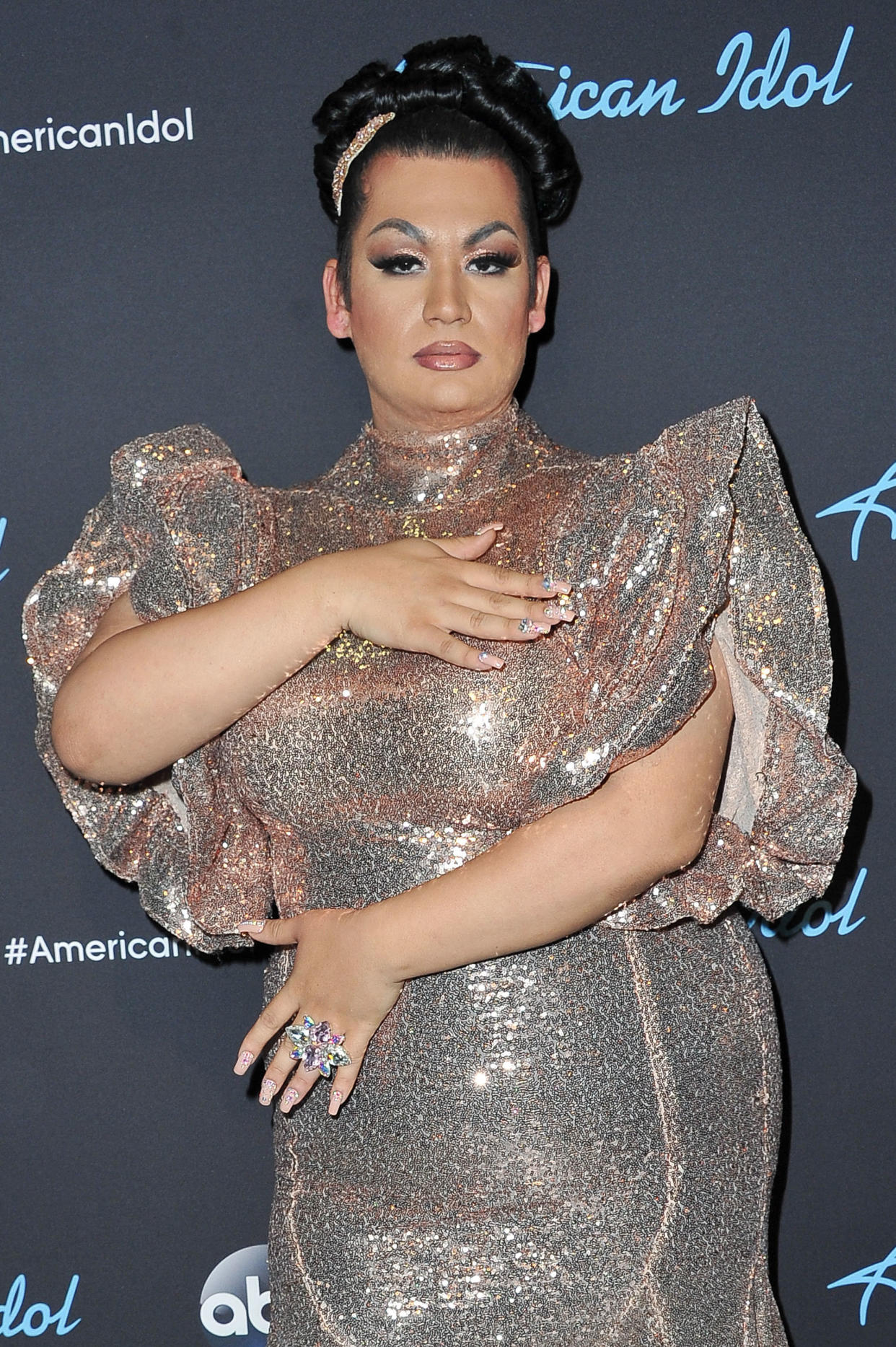Ada Vox Is The Drag Queen 'American Idol' And America Need

Ada Vox is the fierce first drag queen to make it to the top 10 on “American Idol.” And she got there no thanks to America itself. Judges Katy Perry, Lionel Richie and Luke Bryan saved her spot after she did not secure the votes from viewers.
That hasn’t deterred the 13-time contestant ― who had previously auditioned as non-drag self Adam Sanders ― from marching forward, leaving power ballads and iconic duets in her wake.
Speculation over the country’s level of acceptance hovered over Vox’s and other contestants’ would-be eliminations. Jurnee, a black lesbian fellow contestant, was also voted off but saved by the judges.
“It was interesting to see that a lot of the different contestants were not voted through by America,” Vox told HuffPost.
Vox hesitated to point to discrimination for the results of the vote. “I’m not sure exactly what that is a testament to,” she said. “As we know, we are moving forward as a country, slowly but surely.”
Still, Vox stressed that visibility is the key to getting to a more accepting place.
“Although America might not be ready for people like those of us who are a little bit different,” she said, “I think it’s very important that our talents be recognized ― that we be recognized as individuals, to be given one more chance ... to stand up and say ‘Hey, we are just as [worthy] of these platforms. We have dreams, we have talent, and we came here to speak for love.’”
When Vox auditioned as Sanders in 2013, the judges were confused by his song choice ― “I’d Rather Go Blind” by Etta James. Vox believes the contrast between his outward appearance and choice of song was an obstacle then. “I was a chubby Latino boy. I sang big diva songs. I dressed in plaid shirts. And it was too strange a combination.”
Now, Vox told HuffPost everything just makes more sense. And more than that, dressing as Vox has been a source of confidence and self-acceptance. “Performing as Ada kind of gives me a sense of being that true diva on stage. I perform the same songs I’ve always sung the same way I always have. But it’s different when you actually look like the diva that is inside you.”
“Becoming Ada taught me I don’t have to hide behind anything,” Vox added. “It’s a weird thing, because I’m getting into drag to say I don’t have anything to hide behind. But I think other queens and LGBT members will understand exactly what I’m saying.”
“American Idol” contestants win the hearts of America not only with their talents, but by putting their own unique spin on performances. In some cases, that means cultivating a persona that has more mass appeal than authenticity.
Not Vox. Whether that will pay off in future shows is to be determined, but, while Vox acknowledges that performing in drag has become that thing to make her stand out against the competition, she’s not really thinking about there being a likability strategy behind it.
“I was never honestly too worried about fitting into a mold,” Vox said. “I was never worried about thinking ‘Hey, this is what America wants to see, so that’s what I should do.’”
“Stepping in as Ada has offered me the opportunity to create my own lane which no one else has ever done, which I think worked to my own advantage. I can say, ‘I’m not going to worry about fitting into your mold. I’m going to create my own and you’re going to like it.’”
Still, Vox, who performs in drag but also appears as Sanders on the show, is aware that not everyone is ready for a drag queen to reach the level of stardom she hopes to achieve. “A lot of people are ready for that,” she said. “I won’t say most of it, but I will say we are moving to a place where talent is talent and love is love. Once people can look past whatever the exterior may be, I think we as a whole will be a lot more ready to move forward in peace.”
Vox told HuffPost that her hopes for her career involve representing the LGBTQ community ― starting off by being “specific to those crowds” ― immediately followed by a mainstream music career and filling arenas around the world. “I want to do something that maybe no LGBT artist has ever done before.”
We, along with fans all over the country, will be watching and waiting for her to do it. Follow Vox here.
Love HuffPost? Become a founding member of HuffPost Plus today.
Also on HuffPost
This article originally appeared on HuffPost.

